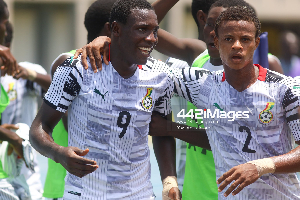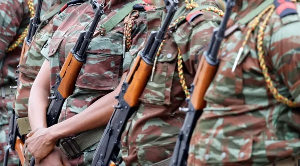I witnessed an occurrence three years ago that has never escaped my mind as an international relations analyst. It had been a few sad days for the country as a statesman whom I worked with had kicked the bucket.
Amidst the sadness however, what caught my attention answered some important questions about Ghana and terrorism—not the vigilante kind. It was the turn of the Islamic leadership of the country to commiserate with the widow and family. In the living room where they were received, the entourage was introduced by an aid to the Chief Imam, who was the head of the group.
Almost all the sects of Islam had their topmost leaders in the country present. The heads of the Sunni, Shia, Tijaniya among others were present and duly introduced in a show of unity in purpose.
This sounds quite normal to the Ghanaian who has always witnessed such events. In other jurisdictions in the Middle East, it would be abominable for a leader of one sect to make an attempt driving through the neighborhood of another.
What amazed me most was when they were leaving the premises and some others and myself had to escort them to their vehicles. The leaders of the different sects shared two cross country vehicles seated side by side. While getting into the vehicles, the Shia leader upon realizing the much (physically) weaker Sunni leader was having some difficulty climbing into the vehicle gave him a helping hand that was so unforgettable.
How I wished Sunni and Shia leaders in neighboring Nigeria and far away societies in the Middle East could witness that and change from their macabre relationships that fester terrorism. The relationship of intra Islamic sectarian leadership is one thing that puts Ghana ahead of other West African states in the sub-region in the fight against terrorism.
Much of what creates fertile grounds for terrorist activities as we know, comes from variations in the interpretations of religious instructions. Often, the extremists who decide to force their interpretations on the local populations or advance it with a pan-religious agenda adopt the use of force through arms and unconventional attacks.
This often starts with the use of such deadly attacks against other sects of the same faith. It is known that Salafi extremist—generally adherents of Sunni Islam—have much antagonism towards Shia Muslims than they do Christians. In the short-existed Islamic state, it was always better to be a Christian or Druze captive than to be, say, an Ahmadi.
The latter identity could easily cost you your head. The tolerance among the various Islamic sects in Ghana is a 'social gold' that puts the country ahead of most in the sub-region. The Chief Imam has displayed an invaluable talent in leading the Islamic community that is grounded in priceless tolerance. He has not hesitated to attend Christian functions and in turn invited Christian leaders to Islamic functions.
As displayed in the home of the late statesman, he has brought the different sects under his intelligent leadership, and kept antagonistic teachings and innuendos against each other, as exhibited in other countries at bay. He has made Islam a apolitical entity in the country, in the midst of rising institutional politicization under the fourth republic.
It is not surprising how diplomats hail and encourage his style of religious leadership. Ghana does not have known rogue teachers of religious extremism. This is a weapon bigger than any missile, military base or armored vehicle in the fight against terrorism.
The level of state penetration in Ghana is relatively better than many of its sub-regional peers, if not the best among the major countries in the neighborhood. Ghana is miles behind other middle-income states around the world. It is however the fact that in terms of state presence in the farthest of places of the country, it is one of the best in West Africa.
Electricity extension, provision of water, health services, schools and roads to the rural communities puts the country in a relatively better position in the fight against terrorism. The country’s performance in this respect has been enabled by the robust decentralization system instituted by the fourth republican constitution.
There is a ‘concord’ among international experts and security analysts that the majority of recruitment and collaborations with terror organizations at the local levels have much to do with state penetration with regard to the provision of basic amenities and other infrastructural needs. Recruiters find it easy to pit locals against authorities when these are absent.
For example, the Madrassas (religious schools) in Pakistan often manned and sponsored by religious extremists have been known to be a major source of extremist indoctrination and recruitment into militant groups. This has been a result of the South Asian state’s inadequacies in the education sector.
In Niger, Mali and Burkina Faso, as well as Northeastern Nigeria—where terror groups are thriving—the provision of basic services are evidently scarce. Indeed, some extremist organizations like those in the Sahel that created an Islamic state some few years back provided basic services to the local population to win their trust and support.
Comparatively therefore Ghana has a domestic edge in fighting terrorism with its fairly effective provision of social amenities. Should resources be readily available for the war on terrorism, Ghana must invest majority of that into the provision of more amenities to the locals, especially those communities on the country’s borders.
The lack of serious centrifugal political forces places the country further ahead of its peers in the region in fighting the southward incursion of terrorist organizations with their nefarious activities. Since independence Ghana’s territorial integrity has not been seriously challenged from within.
Even when challenges to it have emanated from outside the country, it has resorted to conventional means like dialogue and arbitration for settlement. As a consequence, Ghana unlike a number of countries in the sub-region has avoided a civil war since independence.
The institution of democratic systems has also ensured that political opposition remains peaceful. In many countries in the sub-region, political opposition has become physically antagonistic at the expense of state cohesion.
The absence of any serious separatist movement and no macabre government-opposition relations puts the country ahead in the fight against terrorism. Evidence points to the fact that usually, terrorism thrives in states where centrifugal forces are strong and opposition to central government is vicious.
They exploit these fissures in the state to their advantage. Terrorists sometimes cooperate with political groups they share almost no goals with, in order to reach their own goals. In Iraq old forces of Saddam’s army who were more moderate Sunnis sided with the Islamic State and helped them occupy vast lands-they were more familiar with the terrain.
With a Shia dominated government after Saddam, these veterans felt marginalized and as a corollary lend support to extremists to destabilize the state.
The establishment of a ‘mini–Islamic State’ in Northern Mali and some parts of Niger a few years back, had some level of support from the Tuareg rebels who were seeking to have their own state out of the area. This is why Ghana must not take its geographical and inter-ethnic unity for granted.
Where there are signs of potential separatist activities, security and political actors should be steps ahead in resolving them before they escalate. They are magnets for terrorism.
While the heading for this piece portrays a minimalist approach to the use of the military in fighting terrorism, it does not in any way suggests the institution is dispensable in the endeavor. After all the terrorist does not approach empty handed—he comes with arms.
As this piece was being concluded, there were reports by international news agencies including The Guardian, of a massacre by terrorists in Niger that involved over a hundred victims. This obviously calls for immediate response by armed forces to prevent further attacks. The military will therefore continue to be at the front lines of the fight. Ghana’s military has been professional.
It has vividly stayed away from politics since the inception of the fourth republic. A talk to some citizens of Liberia who experienced the Ghanaian soldier always rated them above those of other states that participated in the Liberian peace process.
Despite his or her qualities and indispensability, the Ghanaian soldier should not be overburdened when the fight against terrorism is largely dependent on socioeconomic development and sociopolitical coexistence at the local and national levels. The military and the use of force often becomes necessary when the ‘soft basics’ have not been done well.
Terrorism can be preventive and be avoided with the right domestic environment. Yes, creating more military barracks may be a good strategy for a growing population like Ghana’s, but that won’t fight terrorism in any significant way.
Opinions of Wednesday, 24 March 2021
Columnist: Fidel Amakye Owusu















